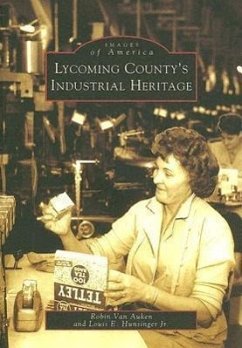Lycoming County has a rich industrial history, first in lumber and then in manufacturing. Thousands were employed as lumberjacks, and others worked in sawmills, planing mills, or furniture factories that processed the lumber. Until 1894, lumber was the county's main industry. Inevitably, the mountainsides were denuded and floods toppled the remaining lumbering companies. The heyday over, many company towns collapsed. Boards of trade were created to entice manufacturers to the region. During the first half of the twentieth century, Lycoming once again prospered with hundreds of new entrepreneurs and companies. Lycoming County's Industrial Heritage documents the people who worked in the factories, mills, and for the manufacturers that no longer exist, victims of recession, urban sprawl, and offshore industries. Each image honors the role of labor and serves as a reminder of the individuals who helped build industrial America.
Bitte wählen Sie Ihr Anliegen aus.
Rechnungen
Retourenschein anfordern
Bestellstatus
Storno

